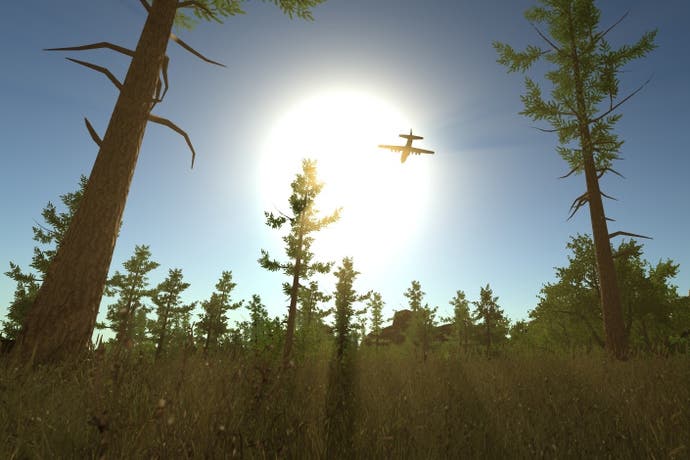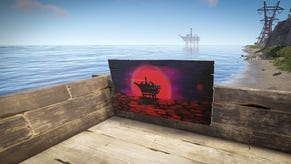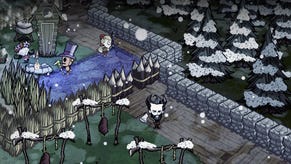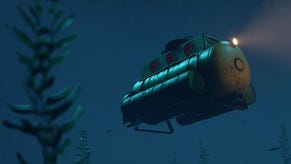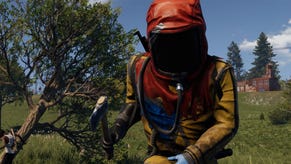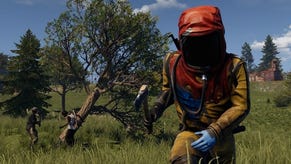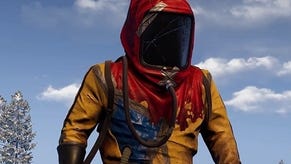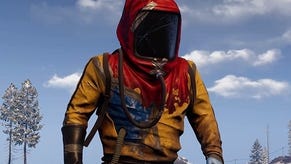Rust alpha review
The naked and infamous.
Eurogamer's alpha and beta reviews are reviews of games that are still in development but are already being offered for sale or funded by micro-transactions. They offer a preliminary verdict but have no score attached. For more information, read our editor's blog.
Rust is a game about survival. But that takes time. Initially, it's just about death. It's about freezing to death, and starving to death, being shot to death and getting bitten to death; occasionally mixing things up a little by slipping on a warm radiation coat and fading faster than your faith in humanity after being stabbed in the back by a supposed friend's hatchet. Sometimes you get gored to death. Other times, bored to death. It's not easy, surviving post-apocalyptic civilisation with nothing but a rock - especially when your enemies have guns, and double-especially in a game that makes you work just to earn a pair of basic trousers.
Even this early into development, Rust's mix of DayZ and Minecraft (the easiest comparison, though Wurm Online is more apt) has won it no shortage of fans - some of them not even psychopaths, hackers and trolls on the hunt for new victims to murder and mock over voice chat. It's the kind of game that's less a shooter than an engine designed to tell stories. Those stories are mostly, as ever, in the field of bastardom, but there's scope for some humanity amongst all the pranks and murder. It's also a world that focuses on demanding effort rather than promising to reward it: starting players out naked and hungry and alone, dangling the potential of going on to build forts, craft weapons, and finally savour the air at the top of the food chain.
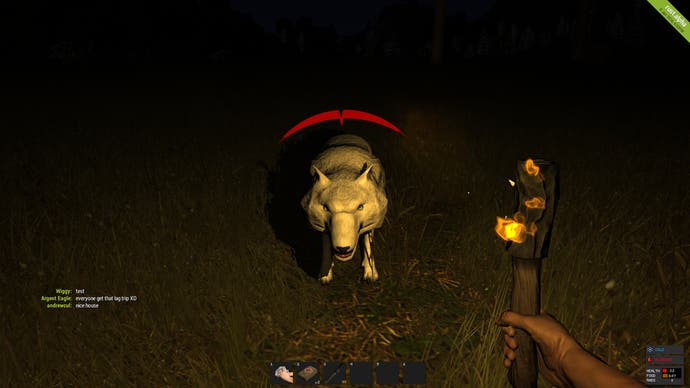
Crafting is the most important part of this, though there are loot crates - both in radioactive remnants of civilisation and regularly dropped from passing planes - that provide free toys to play with and blueprints for advanced gear that, unlike your inventory, survives death. Early on, the priority is making basic tools like a stone hatchet, a bow, a hut and a sleeping bag by beating supplies out of trees and rocks and animals... usually cloth, for some reason. Later, blueprints, furnaces and workbenches offer more advanced gear like metal doors that other players can't so easily get through, and armour capable of protecting against bullets and lingering radiation fields, as well as keeping you warm and covering up your naughty bits.
Building a solid place to call your own is by far the most important thing to focus on - ideally backed up by friends, because on default rules, your character becomes an unconscious, vulnerable sleeper rather than vanishing on log-out. Not all servers use this though, with some even going for pure co-op. It's not a very fun mode to play, though, odd as missing the gankers might seem. Too quiet. Too much time grinding without distraction.
As far as game completion goes, all the basic components here are in place and fully playable, including wildlife to hunt and be hunted by, a range of weapons to craft, and a decent-sized map that's more than capable of handling over a hundred players in its valleys, forests and ruins. Current stress tests are cranking that up to 300 for true Spartan madness.
The basic goal underpinning the action - "Survive!" - feels somewhat unambitious, as well as depressingly acting as license for a player-base of social Darwinists to be on their worst behaviour
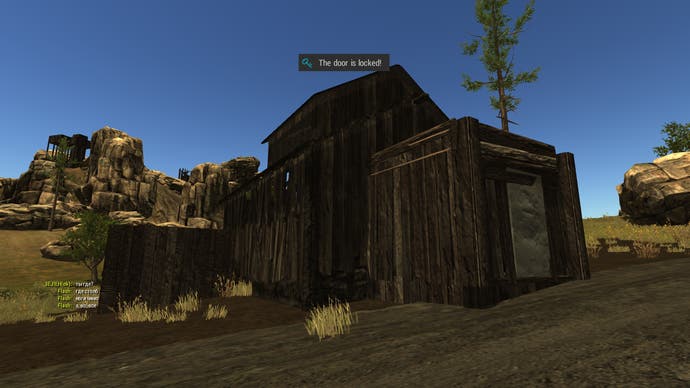
That said, most of the details are very rough, with much work left in everything from making combat mechanically satisfying, to putting proper sound effects in, to generally finding the balance between Rust's various inspirations. The map, for instance, is far blander than DayZ's Chernarus, and mostly filled with generic forestry and plains and space left empty to give players scope to develop each server in their own image. This sounds cool, but at the moment, the primitive components don't offer anything like enough freedom to create interesting things. On a Minecraft server, absolutely anything could be waiting around the next corner in all its blocky glory. Here, it's almost always going to be a generic wood shack or tower, usually long abandoned or fiercely guarded by a proprietorial player who thinks himself a post-apocalyptic badass but acts far more like Cletus the Slack Jawed Yokel.
That side of things being so prominent also makes the basic goal underpinning the action - "Survive!" - feel somewhat unambitious, as well as depressingly acting as license for a player-base of social Darwinists to be on their worst behaviour. The same can be said of DayZ, of course, but in that game the setting and mood go hand in hand with the brutality - ruthless scavengers picking through a broken world gone long past the point of no return. Rust presents something with more possibilities, and in doing so often feels like it should be offering more to actually survive for. At least, something more than finally scraping together the explosives to go kick over other kids' sandcastles.
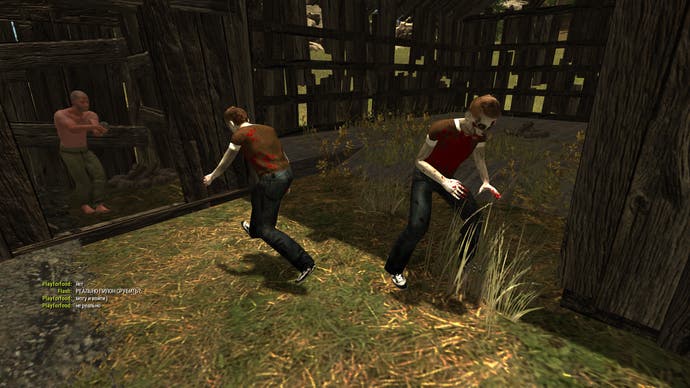
Simply getting to that point offers plenty of challenge, however, not least because the resource economy is currently completely broken - especially on busy servers. Survival requires food, but you can easily starve to death without even seeing an animal to extract life-saving chicken breasts from. (For the moment, it's always chicken, even if it's a pig, though other foods are available elsewhere.) It can also take several lives just to luck into enough stone to construct the most basic hatchet for gathering supplies, or a single piece of the cloth you need to construct a sleeping bag that acts as a respawn point, only to lose it all after being spotted by a player with a gun or getting too close to a wild animal or zombie. Speaking of which, yes, Rust has zombies. Of course it does. They're not around in huge numbers though, and thankfully not long for the world, hanging on for the moment as placeholders for something that can't help but be better simply by not being more bloody zombies.
Provided you're in the mood for a player-versus-player game that makes you work to not simply be a victim, and ideally have a few friends to band together and scare off passing opportunists, Rust's challenge already offers enough of a survival experience to be worth a look. It's as primitive as its rock-smashing cavemen in many ways, and lacks both DayZ's atmosphere and the raw punch of its setting, but the focus on building and crafting does make for a notably different experience. It's worth waiting for a few more patches, though, so that the developers at Facepunch can fix the resource lottery that makes getting started such a chore - and even then, you should take time to find a server where operators are watching for hackers instead of letting them have their fun.
Rust is firmly a base for what might be a great game later on rather than a great one right now. It's seen best in quiet moments, when players aren't around to troll and murder, and crafting and raw survival take the focus. There's more than enough here to suggest great things in Rust's future as it evolves its crafting, its combat, and clears out the zombies to further find its own niche in 2014's upcoming war of survival games. It has the tools to become something very special, and hopefully will provide players with enough to do the same.
Eurogamer's alpha and beta reviews are reviews of games that are still in development but are already being offered for sale or funded by micro-transactions. They offer a preliminary verdict but have no score attached. For more information, read our editor's blog.
